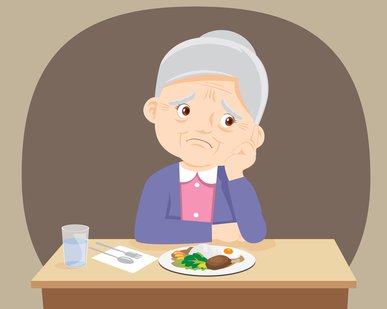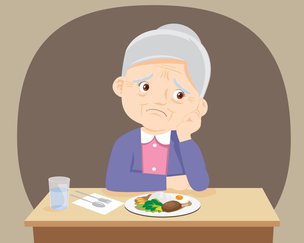"Approximately 1.25 million people in the UK have an eating disorder."

People often associate eating disorders with adolescents or younger people. However, despite the stereotype, there is a growing population of older people who are battling with eating disorders. Eating disorders do not discriminate and can absolutely occur in anyone, no matter how old they are, what their gender is, or what race they are.
What is an eating disorder?
According to the NHS, "An eating disorder is when you have an unhealthy attitude to food which can take over your life and make you ill."
An eating disorder is present when a person is either consistently not eating enough or is overeating. Someone who has an eating disorder will more than likely obsess over their weight and the shape of their body.
There are three categories of older people with an eating disorder:
- Someone who has had an eating disorder for many years which has gone untreated
- Someone who has previously had treatment for an eating disorder but has relapsed
- Someone who has developed an eating disorder later in life
What are the warning signs of eating disorders in older people?
Due to the common misconception that eating disorders primarily occur in younger people, it is not unheard of for the early warning signs of an eating disorder in an older person to be overlooked or mistaken for another illness by people close to the person, sometimes even doctors.
Signs to look out for:
- Weight changes - Has the individual lost/gained weight for a seemingly unexplained reason?
- Preferring to eat in private - Is the individual turning down meal invitations?
- Feeling the cold more - Is the person complaining about feeling cold more often? Has their heating bill gone up?
- Behavioural changes - Has the individual being disappearing to the bathroom straight after meals?
- An increase in their food bill - Have you noticed that the individual is spending more on food?
- Hair loss - Is the individuals hair looking noticeably thinner?
- Medical problems - Has the individual been having medical problems with their heart, oral health or gastrointestinal problems?
- References to being unhappy with their weight and the way that they look - Are they refusing to have photos taken due to thinking they look 'fat'?
Why may an older person develop an eating disorder?
There are several reasons why an older person may develop an eating disorder, including the cultural standards of what is attractive in this day and age.
Here are some reasons why an older person may develop an eating disorder:
- They simply lose the desire to eat - This is also known as clinical anorexia
- Poorly fitted dentures/poor dental health - If eating causes an individual pain, they may stop wanting to eat
- Medications - Some medications cause malabsorption of nutrients which may hinder a persons' appetite
- Lack of physical activity - A lack for exercise will mean that the body needs less energy through food and may not get hungry
- Mental illness including depression and anxiety - Feeling low can lead to a reduction in appetite
- Life transitions such as divorce, the loss of a loved one or retirement - Significant life changes can make a person feel like they are losing control, and an eating disorder may reinstate that feeling of control for them.
- Incontinence - Older people are more susceptible to becoming incontinent, something which they may feel embarrassed about and therefore restrict their intake of food to reduce the number of times they have to go.
What are the most common types of eating disorder in older people?
Anorexia Nervosa
Individuals with anorexia have a distorted body image and will see themselves as being overweight when in reality they are not at all. Quite often, people with anorexia will starve themselves, obsessively count calories or exercise excessively in an attempt to lose weight.
It is said that once anorexia has developed, 50% of patients make a full recovery, 25% continue to suffer from relapse and for 25% anorexia becomes a chronic condition.
Bulimia Nervosa
Bulimia is a disorder where a person will eat a large amount of food before purging it via self-induced vomiting or taking laxatives. Someone with bulimia may also feel the urge to exercise excessively to burn off any extra calories.
Approximately 50% of bulimia sufferers make a full recovery, whilst 30% partially recover. Around 10% of people with bulimia experience poor long-term outcomes.
Binge-eating Disorder
This is a disorder where an individual frequently gets a compulsion to eat excessive amounts of food in a short space of time.
The binge-eating disorder has the best long-term outcome of all eating disorders, with 70% of patients recovering from the condition.
How can we help older people who have eating disorders?
It is difficult knowing what to and what not to say to an older person who has an eating disorder. People with an eating disorder can often be very defensive and may not even realise that they have a serious problem.
The very best thing you can do for someone with an eating disorder is to let them know that you love them & that you are always there for them to talk to.
Another way you can help an older person with an eating disorder is to offer to help them find the help & support they need, and offer to go with them to any appointments if they would like you to. You must speak to them first, rather than arranging help without consulting them, and this could make them withdraw from you.
What are the dangers of eating disorders for an elderly person?
Eating disorders take their toll on all bodily systems regardless of a person's age; however, older people have lower resilience due to the natural ageing process, and therefore eating disorders can damage them more quickly and significantly.
Do you suspect that an elderly person you know has an eating disorder? It's better to act sooner than later so that they can get the help they need! The following organisations provide expert help to those who are suffering from an eating disorder and their loved ones: Beat Eating Disorders / National Centre for Eating Disorders / Anorexia & Bulimia Care
Would you like help finding a care service near you? Please get in touch today!
Call us on 01865 638018
Send message

